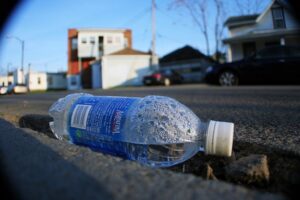by Robin Beres
It isn’t often that a Virginia legislator files a bill calling for increased fines that one is tempted to stand up and cheer for, but a recent piece of legislation submitted by Del. James Edmunds, (R-Halifax), is pretty close.
Edmunds’ bill, HB 1801, calls for increasing the minimum fine for “dumping or disposing of litter, trash, or other unsightly matter on public or private property,” from $250 to $500. (The maximum fine of $2,500 would remain the same.) The bill would also require litterers to perform 40 hours of community service, four times as much the current mandatory minimum of 10 hours.
Edmunds, who has long been a participant in the Virginia Department of Transportation’s Adopt-A-Highway program, says he has seen an increase in litter. His theory is that since restaurants have been closed during the pandemic, more people are ordering food to go and eating in their vehicles. When done, many are simply tossing the empty containers out car windows. Virginia roads have become eyesores.
“The roads are the worst I’ve ever seen them,” Edmunds recently told The Virginia Star. “The status quo is not doing any good. This bill will hopefully bring attention to a terrible problem.”
The Halifax Republican is right — and he isn’t the only one who has noticed a sizeable uptick in the amount of litter on the ground. Bikers, hikers, and regular users of the Virginia Capital Trail have also observed more trash along the route. Discarded water bottles, candy bar wrappers, and other refuse can be spotted almost anywhere along the 51-mile path that runs from Richmond to Jamestown.
In fact, anyone who spends time enjoying the great outdoors — and more Virginians than ever have been doing that since the pandemic began — has probably noticed significantly increased amounts of litter. Since the lockdowns began last March, the number of visitors to both state and national parks have exploded. And sadly, it seems that many of those new nature lovers are unfamiliar with the concept of leaving behind only your footprints and taking only photographs.
“I just can’t imagine having a mindset that I’m just going to throw out my trash on somebody’s place and just dirty up the roads,” Edmunds said during a General Assembly committee meeting last month. “It’s just a lack of respect.” He is right.
And while Edmunds’ observations about food containers being a big part of the growing litter problem is correct, there is one other item that appears to be an even faster growing element of casually discarded trash — the common, disposable, 3-ply face mask.
Almost everywhere one looks today — sidewalks, parking lots, pristine mountain pathways, and even sandy ocean shores — those offensive blue masks can be spotted lying on the ground in various states of decomposition.
Helen Lowman, CEO of Keep America Beautiful, warned last summer that she had noticed an uptick in personal protective equipment (PPE) litter since March. “The face of litter has changed,” she said recently. And Lowman says PPE trash is “exceptionally bad.” She is right. Many of those discarded masks have been used to contain the spread of coronavirus. Some of them could be crawling with germs. To define them as potential biohazards is no overstatement.
On Feb. 3, the House of Delegates passed HB 1801 in a 67-31 vote split almost perfectly between party lines, with both bipartisan support and bipartisan opposition. The bill is now awaiting Senate approval.
In 1901, naturalist John Muir wrote, “Our Forests and National Parks.” In it, he noted that “Thousands of tired, nerve-shaken, over-civilized people are beginning to find out that going to the mountains is going home; that wildness is a necessity; and that mountain parks and reservations are useful not only as fountains of timber and irrigating rivers, but as fountains of life.”
Here’s hoping Edmunds’ bill will encourage everyone to do their part in keeping the great outdoors as pristine today as they were in Muir’s time.



